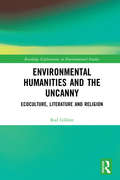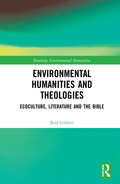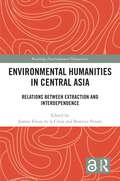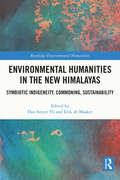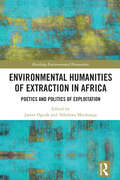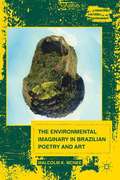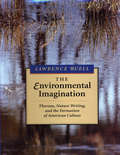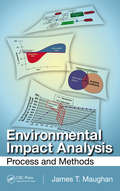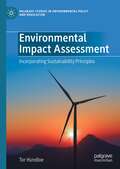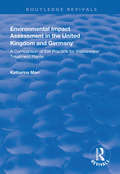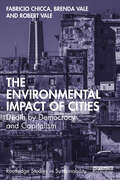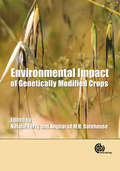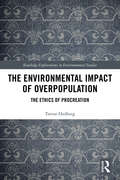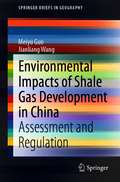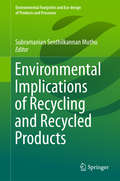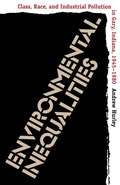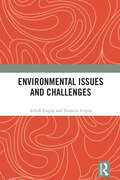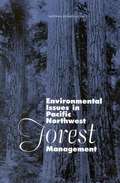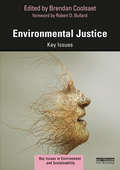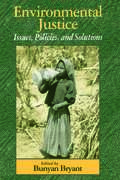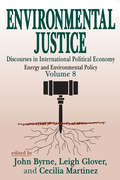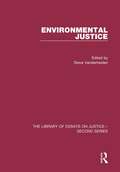- Table View
- List View
Environmental Humanities and the Uncanny: Ecoculture, literature and religion (Routledge Explorations in Environmental Studies)
by Rod GiblettSigmund Freud’s essay on the uncanny is celebrating a century. It is arguably his greatest and most fruitful contribution to the study of culture and the environment. Environmental Humanities and the Uncanny brings into the open neglected aspects of the uncanny in Freud’s famous essay in its centenary year and in the work of those before and after him, such as Friedrich Schelling, Walter Benjamin, E. T. A. Hoffmann and Bram Stoker. This book does so by focussing on religion, especially at a time and for a world in which some sectors of the monotheisms are in aggressive, and sometimes violent, contention against those of other monotheisms, and even against other sectors within their own monotheism. The chapter on Schelling’s uncanny argues that monotheisms come out of polytheism and makes the plea for polytheism central to the whole book. It enables rethinking the relationships between mythology and monotheistic and polytheistic religions in a culturally and politically liberatory and progressive way. Succeeding chapters consider the uncanny cyborg, the uncanny and the fictional, and the uncanny and the Commonwealth, concluding with a chapter on Taoism as a polytheistic religion. Building on the author’s previous work in Environmental Humanities and Theologies in bringing together theories of religion and the environment, this book will be of great interest to students and scholars of the environmental humanities, ecocultural studies and religion.
Environmental Humanities and Theologies: Ecoculture, Literature and the Bible (Routledge Environmental Humanities)
by Rod GiblettMany ways of thinking about and living with ‘the environment’ have their roots in the Bible and the Christian cultural tradition. Environmental Humanities and Theologies shows that some of these ways are problematic. It also provides alternative ways that value both materiality and spirituality. Beginning with an environmentally friendly reading of the biblical story of creation, Environmental Humanities and Theologies goes on to discuss in succeeding chapters the environmental theology of wetlands, dragons and watery monsters (including crocodiles and alligators) in the Bible and literature. It then gives a critical reading of the environmental theology of the biblical book of Psalms. Theological concepts are found in the works of English writers of detective and devotional stories and novels, American nature writers and European Jewish writers (as succeeding chapters show). Environmental Humanities and Theologies concludes with an appreciation for Australian Aboriginal spirituality in the swamp serpent. It argues for the sacrality of marsh monsters and swamp serpents as figures of reverence and respect for living bio- and psycho-symbiotic livelihoods in bioregions of the living earth in the Symbiocene. This is the hoped-for age superseding the Anthropocene. Environmental Humanities and Theologies is aimed at those who have little or no knowledge of how theology underlies much thinking and writing about ‘the environment’ and who are looking for ways of thinking about, being and living with the earth that respect and value both spirituality and materiality. It is a new text nurturing sacrality for the Symbiocene.
Environmental Humanities in Central Asia: Relations Between Extraction and Interdependence (Routledge Environmental Humanities)
by Jeanne Féaux de la CroixThis book is the first collection to showcase the flourishing field of environmental humanities in Central Asia. A region larger than Europe, Central Asia possesses an astounding range of environments, from deserts to glaciated peaks. The volume brings into conversation scholarship from history to social anthropology, demonstrating the contribution that interdisciplinary and engaged research offers to many urgent issues in the region: from the history of conservationism to the tactics of environmental movements, from literary engagements with ‘pure nature’ to the impact of fossil fuel extraction. The collection focuses on the Central Asian republics of the former USSR, where a complex layering of nomadic and sedentary, Turkic and Persianate, Islamic and Soviet cultures ends up affecting human relations with distinct environments. Featuring state-of-the-art contributions, the book enquires into human-environment relations through a broad-brush typology of interactive modes: to extract, protect, enspirit and fear. Broadening the scope of analysis beyond a consideration of power, the authors bring into focus alternative local cosmologies and the unintended consequences of environmental policy. The volume highlights scholarship from within Central Asia as well as expertise elsewhere, offering readers diverse modes of knowledge-production in the environmental humanities. This book is an important resource for researchers and students of the environmental humanities, sustainability, history, politics, anthropology and geography of Asia, as well as Soviet and Post-Soviet studies.
Environmental Humanities in the New Himalayas: Symbiotic Indigeneity, Commoning, Sustainability (Routledge Environmental Humanities)
by Dan Smyer Yü Erik De MaakerEnvironmental Humanities in the New Himalayas: Symbiotic Indigeneity, Commoning, Sustainability showcases how the eco-geological creativity of the earth is integrally woven into the landforms, cultures, and cosmovisions of modern Himalayan communities. Unique in scope, this book features case studies from Bhutan, Assam, Sikkim, Tibet, Nepal, Pakistan, and Sino-Indian borderlands, many of which are documented by authors from indigenous Himalayan communities. It explores three environmental characteristics of modern Himalayas: the anthropogenic, the indigenous, and the animist. Focusing on the sentient relations of human-, animal-, and spirit-worlds with the earth in different parts of the Himalayas, the authors present the complex meanings of indigeneity, commoning and sustainability in the Anthropocene. In doing so, they show the vital role that indigenous stories and perspectives play in building new regional and planetary environmental ethics for a sustainable future. Drawing on a wide range of expert contributions from the natural sciences, social sciences, and humanist disciplines, this book will be of great interest to students and scholars of environmental humanities, religion and ecology, indigenous knowledge and sustainable development more broadly.
Environmental Humanities of Extraction in Africa: Poetics and Politics of Exploitation (Routledge Environmental Humanities)
by James Ogude Tafadzwa MushongaThis book brings together perspectives on resource exploitation to expose the continued environmental and socio-political concerns in post-colonial Africa. The continent is host to a myriad of environmental issues, largely resulting from its rich diversity of natural resources that have been historically subjected to exploitation. Colonial patterns of resource use and capital accumulation continue unabated, making environmental and related socio-political problems a dominant feature of African economies. The book pursues the manifestation of these problems through four themes: environmental justice, violent capitalocenes, indigenous knowledge, and climate change. The editors locate the book within the broad fields of political ecology and environmental geopolitics to highlight the intricate geographies of resource exploitation across Africa. It uniquely focuses on the socio-political and geopolitical dynamics associated with the exploitation of Africa’s natural resources and its people. The case studies from different parts of Africa tell a compelling story of resource exploitation, related issues of environmental degradation in a continent particularly vulnerable to climate change, and the continued plundering of its natural resources. The book will be of great interest to scholars and students from the interdisciplinary fields of the environmental humanities and environmental studies more broadly, as well as those studying political ecology, environmental policy, and natural resources with a specific focus on Africa.
The Environmental Imaginary In Brazilian Poetry And Art
by Malcolm K. McneeThis study contributes to ongoing discussions on the connections between the environmental imaginary and issues of identity, place and nation. Utilizing a delimited ecocritical approach, McNee puts Brazilian culture, through the work of contemporary poets and visual artists, into a broader, transnational dialogue.
The Environmental Imagination: Thoreau, Nature Writing and the Formation of American Culture
by Lawrence BuellThe author provides a major new understanding of Thoreau's achievement and, at the same time, a profound rethinking of our literary and cultural reflections on nature.
The Environmental Imagination: Thoreau, Nature Writing, and the Formation of American Culture (Wiley-blackwell Manifestos Ser.)
by Lawrence BuellWith the environmental crisis comes a crisis of the imagination, a need to find new ways to understand nature and humanity's relation to it. This is the challenge Lawrence Buell takes up in The Environmental Imagination, the most ambitious study to date of how literature represents the natural environment. With Thoreau's Walden as a touchstone, Buell gives us a far-reaching account of environmental perception, the place of nature in the history of western thought, and the consequences for literary scholarship of attempting to imagine a more "ecocentric" way of being. In doing so, he provides a major new understanding of Thoreau's achievement and, at the same time, a profound rethinking of our literary and cultural reflections on nature. The green tradition in American writing commands Buell's special attention, particularly environmental nonfiction from colonial times to the present. In works by writers from Crevecoeur to Wendell Berry, John Muir to Aldo Leopold, Rachel Carson to Leslie Silko, Mary Austin to Edward Abbey, he examines enduring environmental themes such as the dream of relinquishment, the personification of the nonhuman, an attentiveness to environmental cycles, a devotion to place, and a prophetic awareness of possible ecocatastrophe. At the center of this study we find an image of Walden as a quest for greater environmental awareness, an impetus and guide for Buell as he develops a new vision of environmental writing and seeks a new way of conceiving the relation between human imagination and environmental actuality in the age of industrialization. Intricate and challenging in its arguments, yet engagingly and elegantly written, The Environmental Imagination is a major work of scholarship, one that establishes a new basis for reading American nature writing.
Environmental Impact Analysis: Process and Methods
by James T. MaughanThere are thousands of environmental analyses prepared each year to meet the requirements of the National Environmental Policy Act (NEPA) and similar programs. Written by an expert with 35 years of experience in environmental consulting, research, and education, Environmental Impact Analysis: Process and Methods makes the preparation of EIAs not on
Environmental Impact Assessment: Incorporating Sustainability Principles (Palgrave Studies in Environmental Policy and Regulation)
by Tor HundloeThis book provides a detailed treatment of the ecological, economic and social impacts in the context of environmental impact assessment (EIA) and makes clear the necessary link between EIA and the sustainability principles of protecting biodiversity, risk aversion, and inter and intra-generational equity. It proposes that the benefits and costs of a project need to be weighted according to who bears them, giving particular attention to the planet’s poor. Furthermore, this book presents a comprehensive analysis of environmental offsetting which has come to be commonly resorted to when negative impacts cannot be mitigated. In this context, the book argues that offsetting is only viable if advanced offsets are quarantined through a Strategic Environmental Impact approach. Finally, the book explores the role of the various disciplines which need to be mastered in undertaking an EIA.This book takes you on a journey from the beginning of environmental impact assessment to the present day. It is a scholarly warts and all study. For each trial and tribulation, Hundloe presents a remedy. It is essential reading and an invaluable reference for environmental practitioners, politicians, policy makers, academics and, the most important group, future environmental practitioners.
Environmental Impact Assessment in the United Kingdom and Germany: Comparision of EIA Practice for Wastewater Treatment Plants (Routledge Revivals)
by Katharina MarrFirst published in 1997, this volume examines wastewater treatment plants in the UK and their counterparts in Germany in the wake of the International Study of the Effectiveness of Environmental Assessment (1996). Having originated in the United States National Environment Policy Act of 1969, the basic concept of EIAs has been adopted around the world and are highly diverse today. This study aims to examine, compare and suggest improvements for EIA practices as applied to wastewater treatment in the UK and Germany.
The Environmental Impact of Cities: Death by Democracy and Capitalism (Routledge Studies in Sustainability)
by Fabricio Chicca Brenda Vale Robert ValeThe Environmental Impact of Cities assesses the environmental impact that comes from cities and their inhabitants, demonstrating that our current political and economic systems are not environmentally sustainable because they are designed for endless growth in a system which is finite. It is already well documented that political, economic and social forces are capable of shaping cities and their expansion, retraction, gentrification, re-population, industrialisation or de-industrialisation. However, the links between these political and economic forces and the environmental impact they have on urban areas have yet to be numerically presented. As a result, it is not clear how our cities are affecting the environment, meaning it is currently impossible to relate their economic, political and social systems to their environmental performance. This book examines a broad selection of cities covering a wide range of political systems, geography, cultural backgrounds and population size. The environmental impact of the selected cities is calculated using both ecological footprint and carbon emissions, two of the most extensively available indices for measuring environmental impact. The results are then considered in terms of political, economic and social factors to ascertain the degree to which these factors are helping or hindering the reduction of the environmental impact of humans. This book will be of great interest to students and scholars of sustainability, urban planning, urban design, environmental sciences, geography and sociology.
Environmental Impact of Genetically Modified Crops
by Angharad M. R. Gatehouse Natalie FerryThe genetic modification of crops continues to be the subject of intense debate, and opinions are often strongly polarised. Environmental Impact of Genetically Modified Crops addresses the major concerns of scientists, policy makers, environmental lobby groups and the general public regarding this controversial issue, from an editorially neutral standpoint. While the main focus is on environmental impact, food safety issues, for both humans and animals are also considered. The book concludes with a discussion on the future of agricultural biotechnology in the context of sustainability, natural resource management and future global population and food supply.
The Environmental Impact of Overpopulation: The Ethics of Procreation (Routledge Explorations in Environmental Studies)
by Trevor HedbergThis book examines the link between population growth and environmental impact and explores the implications of this connection for the ethics of procreation. In light of climate change, species extinctions, and other looming environmental crises, Trevor Hedberg argues that we have a collective moral duty to halt population growth to prevent environmental harms from escalating. This book assesses a variety of policies that could help us meet this moral duty, confronts the conflict between protecting the welfare of future people and upholding procreative freedom, evaluates the ethical dimensions of individual procreative decisions, and sketches the implications of population growth for issues like abortion and immigration. It is not a book of tidy solutions: Hedberg highlights some scenarios where nothing we can do will enable us to avoid treating some people unjustly. In such scenarios, the overall objective is to determine which of our available options will minimize the injustice that occurs. This book will be of great interest to those studying environmental ethics, environmental policy, climate change, sustainability, and population policy.
Environmental Impacts of Shale Gas Development in China: Assessment and Regulation (SpringerBriefs in Geography)
by Meiyu Guo Jianliang WangThis book features a comprehensive analysis of the development of shale gas resources in China, with a focus on the potential environmental impacts that may result. China has the world’s largest shale gas resources, which it is keen to develop to alleviate air pollution and successfully transition to a low-carbon energy future. However, one significant obstacle standing between the ambition and reality is the potentially serious environmental impacts of shale gas production. This book offers a systematic assessment of these potential impacts, including the risk of water contamination, ecological disruption due to the huge consumption of water and methane leakage. It presents valuable first-hand data collected from the authors’ fieldwork in Sichuan and Chongqing and the latest information on China’s current shale gas operations and also includes a set of models and methods developed to quantify the impacts. It allows readers to gain a deeper understanding of environmental regulatory management systems regarding shale gas production in China by examining whether the existing monitoring, reporting and verification (MRV) systems and environmental regulations can effectively prevent adverse impacts from shale gas production. Providing a detailed study of shale gas development in China based on an unprecedented primary dataset, the book is a valuable resource for scholars, engineers and students who are interested in the energy development and environmental risks.
Environmental Implications of Recycling and Recycled Products
by Subramanian Senthilkannan MuthuThis book includes details on the environmental implications of recycling, modeling of recycling, processing of recycled materials, recycling potential of materials, characterisation of recycled materials, reverse logistics, case studies of recycling various materials etc.
Environmental Inequalities
by Andrew HurleyBy examining environmental change through the lens of conflicting social agendas, Andrew Hurley uncovers the historical roots of environmental inequality in contemporary urban America. Hurley's study focuses on the steel mill community of Gary, Indiana, a city that was sacrificed, like a thousand other American places, to industrial priorities in the decades following World War II. Although this period witnessed the emergence of a powerful environmental crusade and a resilient quest for equality and social justice among blue-collar workers and African Americans, such efforts often conflicted with the needs of industry. To secure their own interests, manufacturers and affluent white suburbanites exploited divisions of race and class, and the poor frequently found themselves trapped in deteriorating neighborhoods and exposed to dangerous levels of industrial pollution. In telling the story of Gary, Hurley reveals liberal capitalism's difficulties in reconciling concerns about social justice and quality of life with the imperatives of economic growth. He also shows that the power to mold the urban landscape was intertwined with the ability to govern social relations.
Environmental Infrastructure in African History
by Emmanuel KreikeEnvironmental Infrastructure in African History offers a new approach for analyzing and narrating environmental change. Environmental change conventionally is understood as occurring in a linear fashion, moving from a state of more nature to a state of less nature and more culture. In this model, non-Western and premodern societies live off natural resources, whereas more modern societies rely on artifact, or nature that is transformed and domesticated through science and technology into culture. In contrast, Emmanuel Kreike argues that both non-Western and premodern societies inhabit a dynamic middle ground between nature and culture. He asserts that humans- in collaboration with plants, animals, and other animate and inanimate forces - create environmental infrastructure that constantly is remade and reimagined in the face of ongoing processes of change.
Environmental Issues and Challenges
by Abhik Gupta Susmita GuptaThis book explores the field of environmental studies emphasizing its multidisciplinary nature. It looks at the fundamentals of environmental conservation and the management of sensitive ecosystems. The book provides an overview of the basic concepts used to understand and study diverse ecosystems and their functions as well as the progressively larger yet mutually inclusive units, such as the landscape and the biome. It examines the challenges towards preserving biodiversity which is under severe threat due to climate change, exploitation of natural resources, pollution, and man-made disasters. Besides outlining the causes and effects, the authors outline control mechanisms to keep pollution within safe limits and offer suggestions for resolving issues such as wildlife poaching and trade, water and air pollution, deforestation, and biodiversity loss through policy changes. This book will be of interest to the students, researchers, teachers of environmental studies, environmental science, sociology, political science, and public administration. This book will also be useful to environmentalists, wildlife conservationists, and policy makers.
Environmental Issues and Challenges
by Abhik Gupta Susmita GuptaThis book explores the field of environmental studies emphasizing its multidisciplinary nature. It looks at the fundamentals of environmental conservation and the management of sensitive ecosystems.The book provides an overview of the basic concepts used to understand and study diverse ecosystems and their functions as well as the progressively larger yet mutually inclusive units, such as the landscape and the biome. It examines the challenges towards preserving biodiversity which is under severe threat due to climate change, exploitation of natural resources, pollution, and man-made disasters. Besides outlining the causes and effects, the authors outline control mechanisms to keep pollution within safe limits and offer suggestions for resolving issues such as wildlife poaching and trade, water and air pollution, deforestation, and biodiversity loss through policy changes.This book will be of interest to the students, researchers, teachers of environmental studies, environmental science, sociology, political science, and public administration. This book will also be useful to environmentalists, wildlife conservationists, and policy makers.
Environmental Issues In Pacific Northwest Forest Management
by National Research CouncilPeople are demanding more of the goods, services, and amenities provided by the forests of the Pacific Northwest, but the finiteness of the supply has become clear. This issue involves complex questions of biology, economics, social values, community life, and federal intervention.Forests of the Pacific Northwest explains that economic and aesthetic benefits can be sustained through new approaches to management, proposes general goals for forest management, and discusses strategies for achieving them. Recommendations address restoration of damaged areas, management for multiple uses, dispute resolution, and federal authority.The volume explores the market role of Pacific Northwest wood products and looks at the implications if other regions should be expected to make up for reduced timber harvests.The book also reviews the health of the forested ecosystems of the region, evaluating the effects of past forest use patterns and management practices. It discusses the biological importance, social significance, and management of old-growth as well as late-succession forests.This volume will be of interest to public officials, policymakers, the forest products industry, environmental advocates, researchers, and concerned residents.
Environmental Justice: Key Issues (Key Issues in Environment and Sustainability)
by Brendan CoolsaetEnvironmental Justice: Key Issues is the first textbook to offer a comprehensive and accessible overview of environmental justice, one of the most dynamic fields in environmental politics scholarship. The rapidly growing body of research in this area has brought about a proliferation of approaches; as such, the breadth and depth of the field can sometimes be a barrier for aspiring environmental justice students and scholars. This book therefore is unique for its accessible style and innovative approach to exploring environmental justice. Written by leading international experts from a variety of professional, geographic, ethnic, and disciplinary backgrounds, its chapters combine authoritative commentary with real-life cases. Organised into four parts—approaches, issues, actors and future directions—the chapters help the reader to understand the foundations of the field, including the principal concepts, debates, and historical milestones. This volume also features sections with learning outcomes, follow-up questions, references for further reading and vivid photographs to make it a useful teaching and learning tool. Environmental Justice: Key Issues is the ideal toolkit for junior researchers, graduate students, upper-level undergraduates, and anyone in need of a comprehensive introductory textbook on environmental justice.
Environmental Justice: Issues, Policies, and Solutions
by Jamal Kadri Robert Wolcott William Drayton Deeohn Ferris Roger Bezdek Kelly AlleyIn Environmental Justice, leading thinkers of the environmental justice movement take a direct look at the failure of "top down" public policy to effectively deal with issues of environmental equity.The book provides a startling look at pressing social and environmental problems and charts a course for future action. Among the topics considered are: the history of the social justice movement the role of the professional in working with community groups methods of dealing with environmental problems at the international level participatory national policy for environmental education, energy, industrial development, and housing and sustainable development.Contributors include Robert Bullard, Deeohn Ferris, Tom B.K. Goldtooth, David Hahn-Baker, Beverly Wright, Ivette Perfecto, Patrick West, and others.
Environmental Justice: International Discourses in Political Economy
by Paul ThompsonEnvironmental justice is one of the most controversial and important issues in contemporary social science. Volume 8 of the Energy and Environmental Policy series challenges our understanding of environmental justice in a global context. It includes theoretical investigations and case studies by leading authors in the field.Global forces of technology and the development of global markets are transforming social life and the natural order. These changes require a critical examination of nature-society relations. Increasingly, modernization assigns the risks of modernity to those with the least power and greatest vulnerability to environmental harm. Conventional environmentalism, which focuses on critique of the effects of humanity against nature, is inadequate to the challenges of globalization. In particular, it fails to explain sources of persistent patterns of social injustice that accompany escalating environmental exploitation. As the capacity for environmental destruction expands, broader concerns about environmental injustice have come to the fore, including awareness of threats to whole cultures, ways of life, and entire ecologies. The volume's authors consider the links between expanded patterns of environmental injustice and the structures and forces underlying and shaping the international political economy.Environmental injustice is examined across a variety of cultures in the developed and developing world. Through case studies of climate colonialism, revolutionary ecology, and environmental commodification, the global and local dimensions of the problem are presented.The latest volume in this important series demonstrates that environmental justice cannot be reduced to simple parables of indifference, prejudice, or appropriation. It forges understanding of environmental injustice as a development of international political economy itself. Likewise, initiatives on behalf of environmental justice are seen as elements of broader movements to secure self-determination in a globalizing world. This book will be of interest to policymakers, energy and environmental experts, and all those interested in the environment and environmental law. It provides new perspectives on the place of environmental justice in international political and economic conflict.
Environmental Justice (The Library of Essays on Justice - Second Series)
by Steve VanderheidenThis collection of scholarly articles takes as its subject matter discourses on environmental justice. The concept emerged in recent decades as an important framing concept for a wide variety of environmental movements and objectives, and has gained considerable currency due to the scope and normative force that its principles contain, whether in legal, political, or philosophical applications. This collection is an invaluable resource for researchers and scholars in this field given that the multiple theories and analyses of environmental justice are likely to remain central to the ongoing development of normative theorizing about the human role in the environment in the foreseeable future.
